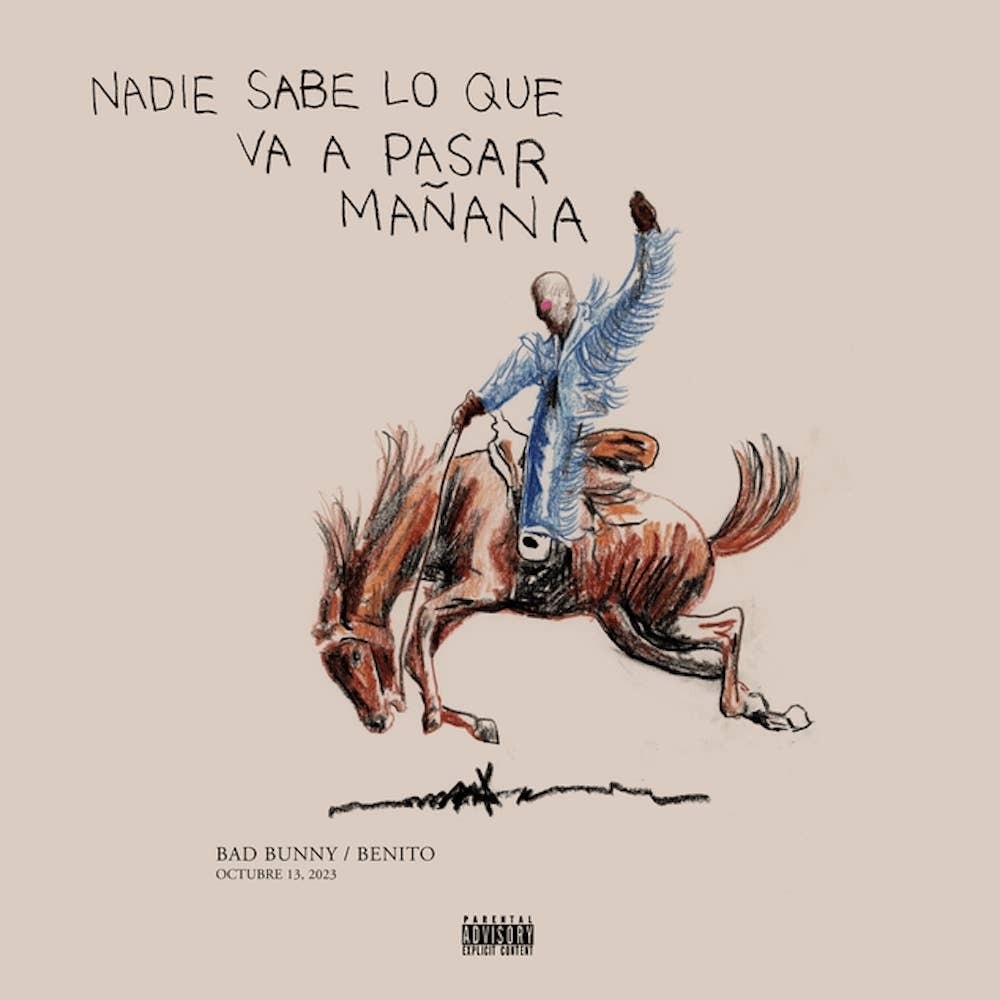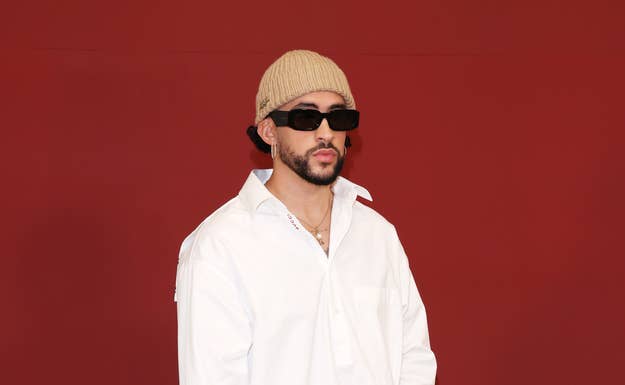
Best song?
Ecleen: “Ya no estoy en mi peak/Ahora estoy en mi prime,” Bunny spits in his bar-filled run on the album’s opener, “Nadie Sabe.” “I’m not in my peak/now I’m in my prime.” Full of other diary-like thoughts on the page, the track sets the tone, and locks me in, with simple production and juicy writing. He also credits his flow to God, and to Tego Calderón—which was beautiful to hear. The latter of whom he also included on the actual album. Very full circle and needed. And, because I’m having a hard time picking between the three-song run at the top, in general, I’ll also include “Fina,” which is the song Calderón is on, alongside the promising Young Miko, who dominates the wax.
Kimberly: I really enjoyed both “Fina” and “Monaco.” After listening to “Fina,” I immediately went back and listened to “Pa’ Que Retozen” in El Abayarde by Tego Calderón. In addition, it was great to hear “Hier Encore” by Charles Aznavour sampled in the beginning of “Monaco.” Charles Aznavour was regarded as one of the greatest songwriters of all time and a 20th-century pop culture icon. At the end of the song, on the outro, Charles’ vocals translate to: “Yesterday I was 20years old/I caressed time, and enjoyed life/Like we play with love and I lived the night/Without counting on my days, which were fleeing in time,” which feels intentional, perhaps in relation to his personal life.
Alejandro: “Monaco” is a heavy front runner for best song. It seems Bad Bunny wanted to set the tone for the album early with this song by flexing how lavishly he lives compared to his colleagues and critics. The production is a mix of ‘80s classy, with modern, hip-hop.
Biggest skip?
Ecleen: “Baby Nueva” was one of the biggest skippable tracks for me upon first listen. Could be because I’m (thankfully) not in the mood it requires, or the fact that it’s a tad less compelling production-wise than the rest.
Kimberly: “Hibiki” will probably grow on me as I continue to listen, but for now it’s a skip for me. I like that it’s a collaboration with Mora, but I am really not a fan of the beat. It almost sounds like techno to me, which I’m not a fan of.
Alejandro: If I had to pick one it would be “Vuelve Candy B,” mainly because on the first listen, it kind of sounded like repetitive flexing on the competition (outside of the Messi references). It’s still a strong song but the one I skipped over on the first listen.
Best thing about the album?
Ecleen: The best thing about this project is the way it continues to build on the best of Bunny; it finds him floating while tethered to both his past and present (picture a human Nostromo with a leg that attaches him to his trap era in the beginning of his career and another that visually, stylistically is in 2023). He stays true to himself, in a way, with all Spanish songs, and no “American” artists with infectious trap that will even further expand his hip-hop-leaning audience who perhaps didn’t follow him at the start of his career.
Kimberly: For more than half of the album, Bad Bunny cosplays the style he had back in his trap era, featuring people who he used to collab with like Arcángel, De la Ghetto, and Ñengo.
Alejandro: Innovative production on the beats for the album were refreshingly amazing. Bad Bunny successfully avoided sounding like everyone else while showcasing that he can still rap and push the envelope.

Worst thing about the album?
Ecleen: Similarly to Drake, Bad Bunny went ahead and gave us an album with more than 20 tracks. And, similarly, that makes it a recipe for some songs to be a success while others are… not necessarily a failure, but definitely skippable.
Kimberly: I feel like this album is carried by features—with newcomers and veteran artists like Bryant Myers, Feid, Young Miko, Mora, and Eladio Carrión—who dominated more than Bad Bunny. I love his trap era, but it felt a bit too repetitive at times here.
Alejandro: Was expecting him to have a crossover feature so I was disappointed when there wasn’t anyone from the English-speaking world, but it also means that Benito just doesn’t need it.
Biggest surprise?
Ecleen: The biggest surprise was the fact that this isn’t a reggaeton album. “I’m not a trapper/trap artist or reggaetonero,” he says on “Nadie Sabe.” It was a pleasant surprise. The not so positive surprise was that he didn’t properly credit his features, which he’s done in the past (notoriously not crediting Nesi on the original “Yo Perreo Sola,” which he then somewhat amended on the remix with Ivy Queen). He’s clearly learning and growing, but has some more to do too.
Kimberly: I was surprised he didn’t add the names of the featured artists to the list of songs. I was also surprised there were no features on “Mr. October.” I’m sure everyone was expecting Drake to be on this song.
Alejandro: The amount of shots taken toward the industry and other artists. Benito held receipts and really came for everything and everyone.
Favorite bar?
Ecleen: “Creo que maduré/Espero que no sea tarde,” on “Nadie Sabe.” “I think I matured/I hope it’s not too late.”
Kimberly: “Tu no eres mi fan real/Por eso te tire el celular,” on “Nadie Sabe.” “You’re not my real fan/That’s why I threw your phone.” The line is referring to the fan whose phone he threw into the water earlier this year.
Alejandro: A ti ni te conocen ni en tu barrio/Ayer estaba con LeBron, también con DiCaprio,” on “Monaco.” “They don’t even know you in your hood./Yesterday I was with LeBron, and also with DiCaprio”
Final thoughts/overall first impressions?
Ecleen: In direct opposition to some of his features lately (namely “Gently” and “K-POP”), I will be running at least a handful of these songs back this weekend. This project is a testament to his star power and an assertion/reminder that Bad Bunny (and the slew of other unlisted Latin stars here, really) doesn’t need the anglo market—they need him, and them. Despite nearly everything in his life changing drastically over the last year, Bad Bunny reminds us he is (somewhat) still him—both socially and personally. He dips into his introspective romantic bag, floats his wild ruminations and punch lines over hard trap beats by way of his go-to producers, and honors PR, and the people he likes most in them—artists and otherwise. The latter seemingly includes his ex, Gabriela, which was a surprise given his current, apparent dating situation. “I thank God for putting Jan, Noah, and Gabriela in my path," he says on “Acho PR,” and later ends with “No, no, no, it was Gabriel, haha.” There are both a growth/maturity and childlikeness/immaturity throughout the album, but a lot of that, really, feels like a reflective almost-30 Benito, which will be relatable to his millennial fans, as will the samples and features he selected.
Kimberly: Benito went back to his trap roots, and I didn’t skip any song on first listen. To appreciate it and understand why fans are going crazy over it, you have to understand the cultural context of this album, which goes back to 2015–18. A lot of his features are people who he used to collab with, like Bryant Myers in “Seda.” I can’t even begin to tell you how nostalgic I felt when I heard Bryant Myers and Tego Calderón. The main appeal of his trap era was his unforgettable hooks and dynamic beats, and he brings that back here. In “Nadie Sabe,” he states, “Este disco no es pa’ ser tocado en un millón de vista/Es pa’ que mis fans reales estén contento,” which translates to “This album is not to be played in a million views/It is to make my real fans happy.” The problem is that a lot of people were waiting for reggaeton, but in reality, it’s really a trap album for his older fans.
Alejandro: Bad Bunny never disappoints. I knew not to expect Un Verano Sin Ti or any of his previous albums on this project because what I’ve learned is that he is going to do something different and you’re gonna like it. The bars on each song matched in terms of flow, beats, and tone, which makes it easy to listen to the album front to back.
